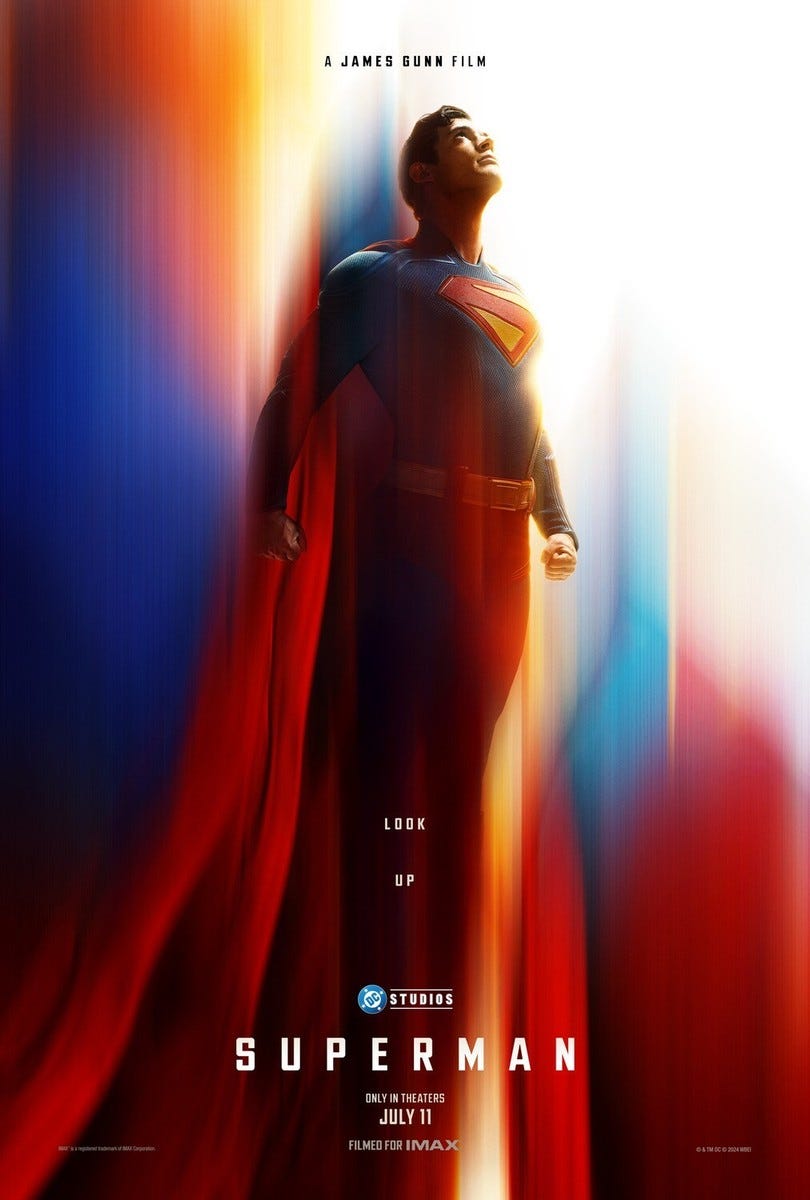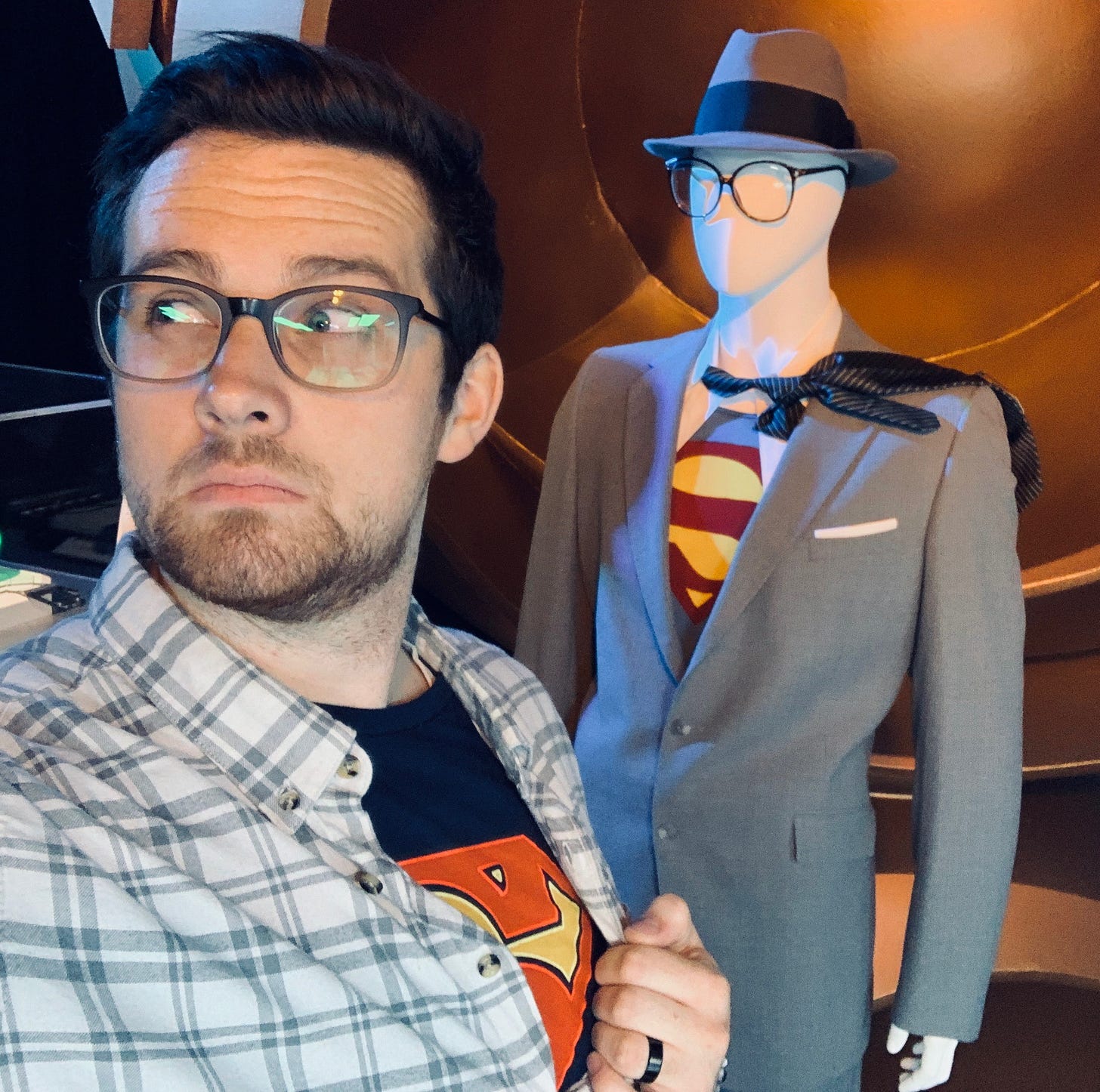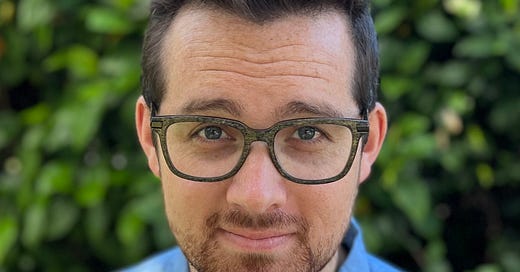Q&A with CJ Lindsey
I spoke to HBO Max content strategist CJ Lindsey about the work behind streaming platform algorithms, plans for the upcoming Superman film, and the battle of cynicism and hope in our current media.
One of my favorite courses I took in film school was a class about media literacy: the simple but potent idea that whatever media we intake, no matter how big or small, has some internal effect on us and who we are. Who better then to speak about the role that movies play in our lives than CJ Lindsey, one of the folks behind “the algorithm” at HBO Max? As a content strategist for the streaming platform, CJ helps coordinate the streaming releases of major fandom brands, whether that’s DC Comics properties like Superman or The Penguin or family friendly hits like A Minecraft Movie. It’s a big responsibility, and one CJ takes seriously– he’s very cognizant of the way that parasocial relationships with our favorite television characters can have real impacts on our lives. Enjoy the interview– it’s a fascinating look behind the curtain of content curation!
Your current job is not one I’d think most people have heard of—it’s also probably a dream career for some people. Can you describe what you do for work?
I do content strategy for HBO Max, for all the movies and all the kids and family content, and more recently, all of the fandom content as well. So, essentially, think about it as a professional recommender of content. What a lot of people think of as “the algorithm” is either a person, or a person training the algorithm… and I'm that person. So if a movie comes to HBO Max, I then decide, who is the audience? And I try and get it in front of them in a variety of different ways.
What’s a typical day for you at HBO Max?
It's a lot of content curation. So a typical day would be a bunch of meetings to talk about what the priorities are for HBO Max as a whole, and then do a lot of content curation. Earlier today, I did a summer blockbusters curation. So I look at the content that we have, I put a curation together, and then put that into the system. And it is informed as people interact with it, watch movies, click on it, pass on it—all that informs the algorithm. I did some for Sinners. I’ve done some for Superman, in anticipation of its theatrical release. I did some for Minecraft. It's a lot of figuring out the audience and then curating content to that audience.
Give me an example of Minecraft. What are people seeing because of your work?
Minecraft essentially has two audiences. One is family, obviously; kids that love Minecraft the game love the movie. The other side is—I don't know how to say it any other way—a stoner audience. You’re looking at people in their early 20s who grew up with Minecraft. These are the guys that went to the theaters and destroyed the theater. So your “Enter the Mine” curation is going to be different depending on which side of that coin you’re on. We had one we called “Chicken Jockey Energy,” which was all off-the-wall comedies. And then we had a curation that swapped. When it was Daytime mode, it was optimistic, happy content. And then it swapped at 7 o'clock every night to be Nighttime mode, and it was darker stuff like Hunger Games and things like that.

What's a five-alarm fire at your job? When it’s all hands on deck, what are you doing?
There's kind of two things that will happen. One will be some major current event. I don't want to even put this out there, but let's say that hypothetically, Denzel Washington passes away. We will jump in there and elevate Denzel Washington content as a sort of “in memory of” kind of thing. That happens more often than I'd like, but it happens. And then the other one will be if the algorithm does something wrong. I'll give you an example. One of the things that I do is I assign tags, like metadata, to content, so that the algorithm understands what to elevate. And there was a movie called The Zone of Interest that I put a “family focus” tag on.
Oh no.
Because technically, technically, it is about a family! But I didn't understand the situation. I was not fully up to date on how the algorithm worked; it was all new. And so it elevated The Zone of Interest in the “family friendly” tile. Now that is a fire, because the way that we become aware of it is through Twitter. It was on a Saturday, and suddenly my phone went ballistic. Luckily, the word from up top was just, “How do we make sure this doesn't happen again?” So I took responsibility, and it blew over fairly quickly.
With the upcoming Superman film, what does that look like for you? How are you coordinating or preparing for this?
So Superman is slightly different because it is the number one priority for Warner Brothers and DC throughout 2025. So the conversations around what the strategy was going to be around it started way earlier than most movies. We’ve been meeting about how to elevate Superman throughout the entire year. So in April, it was Superman Day. We elevated Superman content there. We have a lot of superhero “fringe" kinds of fans on our service—think of an HBO fan that loves quality content but doesn't understand that some of the superhero stuff that we have really is quality content. I'm trying to get that person to watch Peacemaker or The Penguin so that they get a step closer to Superman. And we are doing Superman beats, all throughout the entire year, in anticipation. Very soon we’ll have the theatrical release, and at some point after that, it'll come to HBO Max.

Some people might say that these big franchises, they’re strangling creativity in Hollywood, or they're squeezing the oxygen out of things that are more auteur, more high art. What's your answer to that?
I think there's a larger philosophical conversation about if big franchises are important or not or how they contribute to society and pop culture and all of that. But I'm going to answer with the low hanging fruit: there's a reason that something is called a tentpole movie. If you have a bar graph and you're tracking the earnings and titles, the reason you call it a tentpole is because it's the highest bar, and it helps pay for everything else. So if you want auteur movies, if you want independent movies, you have to have movies that make money. Big franchises, sequels, IP (intellectual property)—that's what makes money. So people can be upset with it all day long, but without them, that other stuff just doesn't get made. A24 is maybe a massive exception, but they're the exception that proves the rule; that's all.
You've had an atypical path coming into the film industry. I'd love to hear you walk me through that.
I’m from Kaysville, Utah. I came to Los Angeles almost nine years ago, moved here to go to film school, graduated in entertainment business, and got a job at DC Comics. My wife and I were both working there, and I fell into the content strategy team there. I started as just a peon, somebody that caught anything that fell through the cracks. Then they discovered that I knew the content super well, and they needed somebody to contribute to their engagement team. At this point there was a streaming service called DC Universe, but when they announced HBO Max I saw the line in the sand; I realized one company's not going to have multiple streaming services because it'll cannibalize its own network, its own audience. So I jumped over to HBO Max, and I got a job in Kids and Family content, where I was doing the same thing I was doing for DC but for kids and family. And I felt a kind of social responsibility. How adults intake content and how kids intake content is very different, and how it influences what can happen in them is very different. I began to feel a social responsibility to understand how content could affect kids. So I actually went back to school and got a media psychology Masters Certificate to understand just how content affects the developing brains of kids, which was super helpful and way more applicable to way more of my job than I realized. I’ve had additional responsibilities added to my job now—I'm a big nerd coming over from DC, so they put me in charge of the nerdy stuff like Minecraft and Superman. Hopefully, fingers crossed, I get to do stuff like the Green Lantern show coming from HBO and the new Harry Potter show that's coming in a couple years. Those are the kinds of things that I want to work on in the future.

You mentioned you went back to school and got a media psychology degree. What did you learn that was so applicable to your job?
The biggest thing is the power of parasocial relationships, both for kids and for adults. A parasocial relationship is a one-sided relationship, whether it's with a character that's fake or a celebrity that's real. For example, I have a parasocial relationship with Superman. I’ve got a neighbor that has a parasocial relationship with Britney Spears. The power that this character or celebrity has over the people that are attached to them is so much more significant than we realize. There was a study done to understand what kids mentally retain. They had a cartoon character, one no kid had ever heard of, teaching them math. And then they made the exact same cartoon, but just put SpongeBob SquarePants in the place of the unknown character. And the difference was over 80% more retention of the information, because it was coming from SpongeBob rather than an unknown character. And they’ve found that while adults think that it doesn't affect them, it very much does. If Superman taught me math when I was a kid, I'd be a genius.
So I guess that really raises the stakes, then, for these characters to have a moral compass themselves. I feel like the last 15 years of TV has been about the rise of these anti-hero characters: your Don Drapers or your Walter Whites.
Totally. So I worry about stuff like Deadpool, especially if Deadpool is shown to kids too early. It’s going to create a lot of cynicism in them as they grow up. I was so passionate about that that I actually wrote a book. It's called Growing Up vs. Growing Old. And it talks about something that is fundamental to me, which is that I believe that the world has mistaken maturity and cynicism. And we have equated them together. The older you get, the more of life you experience, it's inevitable that you become cynical. Don Draper is a very cynical character. And a lot of people are going to view him as the pinnacle of maturity, you know what I mean? He's got the suits. He's got the swagger, right? And everyone wants to be that.
And that's one of the reasons I'm so passionate about Superman. I believe that hope is just the exact opposite of cynicism, right? It’s much more mature to push through the hardships with the understanding that it can be better.
Let me ask something about Superman. Was there a particular comics run that you feel like had that big impact on you and helped shape who you are?
What had the biggest impact on me as a kid was definitely Superman: The Animated Series. As far as comics go, in my early teen years I discovered All-Star Superman. And that had a big impact on me; I think it maybe even made me a hopeless romantic. The premise is basically, if Superman gets cancer, how does he live his last days? And it just showed what was important to the character. And despite all the power in the world, what was important to him was the same thing that's important to everyone else.

How has your faith informed your work in this industry?
I think that I have applied it all to my understanding about cynicism and maturity and hope. Like, Superman being the symbolism of hope has translated into my faith and understanding of what hope actually is. Like, the introduction to the concept came from Superman, the actual delving into how it impacts humanity came through my faith and through my studying of the scriptures. So it dovetails perfectly. And the reason that I can fight cynicism so effectively is because of my testimony in Christ and in the Atonement and what the future holds for everybody. Even when it gets bad, and it's gonna get real bad, the end goal is immortality, eternal life, and the joy of man.
Is there any advice that you'd give to an aspiring LDS filmmaker?
I think one of the things that I've learned is whether you’re LDS or not, don't be quiet about your faith. If you keep it to yourself, you have no accountability, you have no standards to live up to because it's all in your head. You can justify anything really easily. If you're not quiet about your faith and you let people know where you stand, they will help you stay in line. If I were to go to a happy hour with my coworkers and order a beer, not a single coworker would let me drink that beer. They'd be like, “What are you doing? We know you.” That's actually been really helpful. And I think it's probably the opposite advice from a lot of people that are not here [in LA] would give you. In fact, I had somebody come up to me before I moved out here. She told me to change my phone number because, and I quote, "Nothing says ‘I don't know what I'm doing’ like an 801 phone number.” But guess what doesn't matter at all [in Hollywood]? The area code on my phone number. No one cares. No one pays attention to it. No one knows! Anyway, I think a lot of people that aren't out here would tell you, "Hey, keep it to yourself.” And I would say, “No, live out loud.” You may get some haters because of it, but it's going to be easier to stay true to who you are if people know who you are.





Another great one, filled with great lines. Haha I especially love “If Superman taught me math when I was a kid, I'd be a genius.”
With AI, not too late, Mr. CJ!
Excited to see future curations on my home page!
Nice one, CJ!